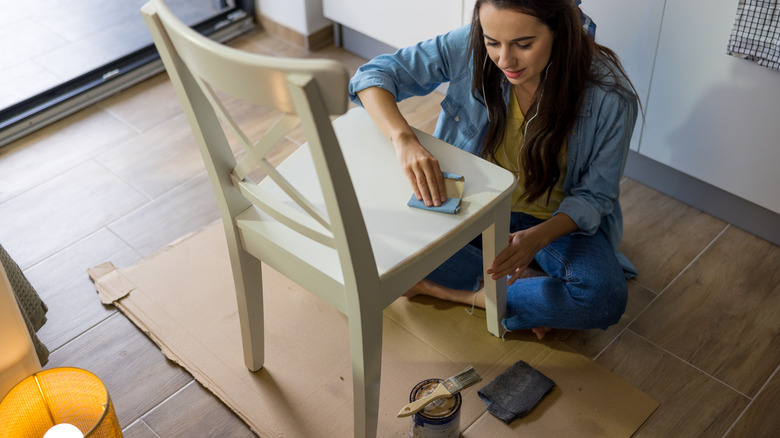Make IKEA Furniture Look Like Genuine Wood With A Simple Paint Trick
We may receive a commission on purchases made from links.
Over the past 80 years, IKEA has become almost synonymous with affordable, modern furniture. The Swedish superstore, with its often difficult-to-pronounce product names, has introduced millions of people around the world to Scandinavian design. You know an IKEA piece when you see it, but thanks to the internet and its massive IKEA hack culture, those clean lines and smooth surfaces are also a blank canvas begging to be personalized. One way to add a little DIY flare to your IKEA pieces is to mimic a wood grain texture using a simple painting trick.
Kate Ward (@kateandherhome) demonstrated this technique in a tutorial video on Instagram using an IKEA HEMNES dresser, 180-grit sandpaper, sugar soap, paint, and a brush. To replicate this design, you'll first need to remove any drawers or other unattached components and uninstall the hardware. Then, lightly sand your furniture, clean it with sugar soap, and leave it to dry completely before applying a base coat of paint in the direction you want your wood grain to go. After 12 hours, apply the second coat of paint using a dry brush and even strokes in the same direction as the base coat. After the top coat is dry, reinstall the hardware and reinsert any pieces you removed.
Tips that make all the difference
If you've never used sugar soap before (on Amazon for about $17), it is a game-changer, specifically designed to remove grime and prepare surfaces for new paint. The type of paint you use is also key. Ward used Refresh Wood Effect by Maison Déco (available at Homebase for about $36 but only in the United Kingdom). A similar alternative is Liquid Wood by Retique It, starting at $22.99. Just be sure to follow the application instructions for the paint you choose. Even if you use regular paint, you can add sawdust to create a wood-like finish.
Most IKEA furniture is made of particle board or engineered wood that can be easily damaged by vigorous sanding. That isn't to say you cannot sand IKEA furniture, you just need to do so with fine grit sand paper and lightly scuff the surface. Another trick to painting these difficult surfaces is to skip the sanding and use a shellac-based primer.
The secret to getting the wood look is dry brushing. This technique dates back centuries and is often used by landscape artists to mimic natural textures. As the name suggests, it involves loading a small amount of paint onto the tip of the brush without wetting it first. This leaves dry gaps in the bristles that drag along the surface you're painting and adds striations, which results in a wood grain texture. Practice on a scrap piece of wood or a less visible part of the dresser first to get the hang of it. If you mess up, the beauty of painting is that you can always cover it up and try again.
